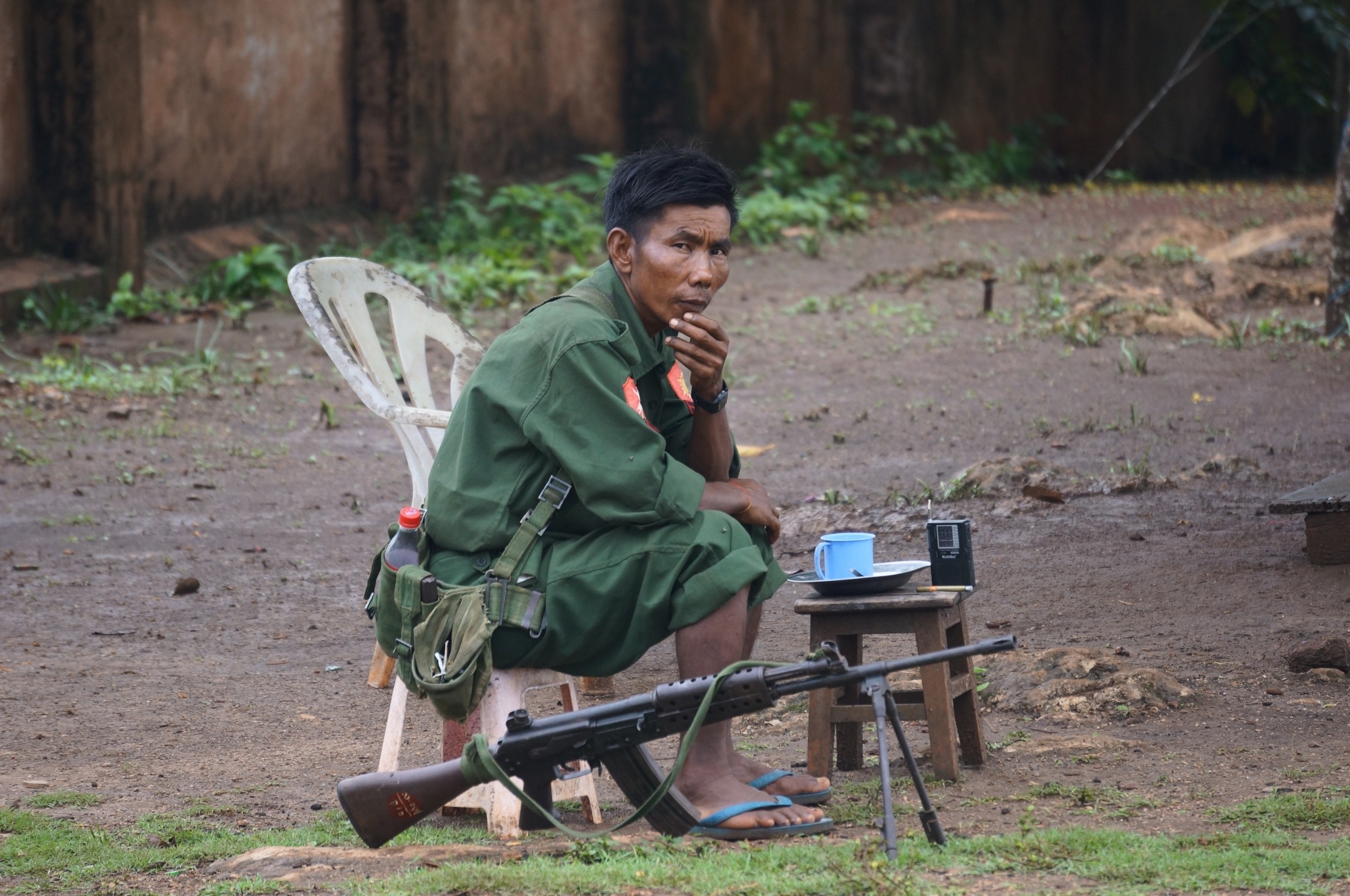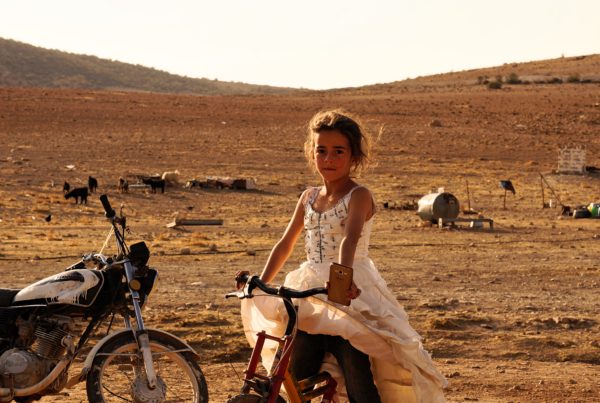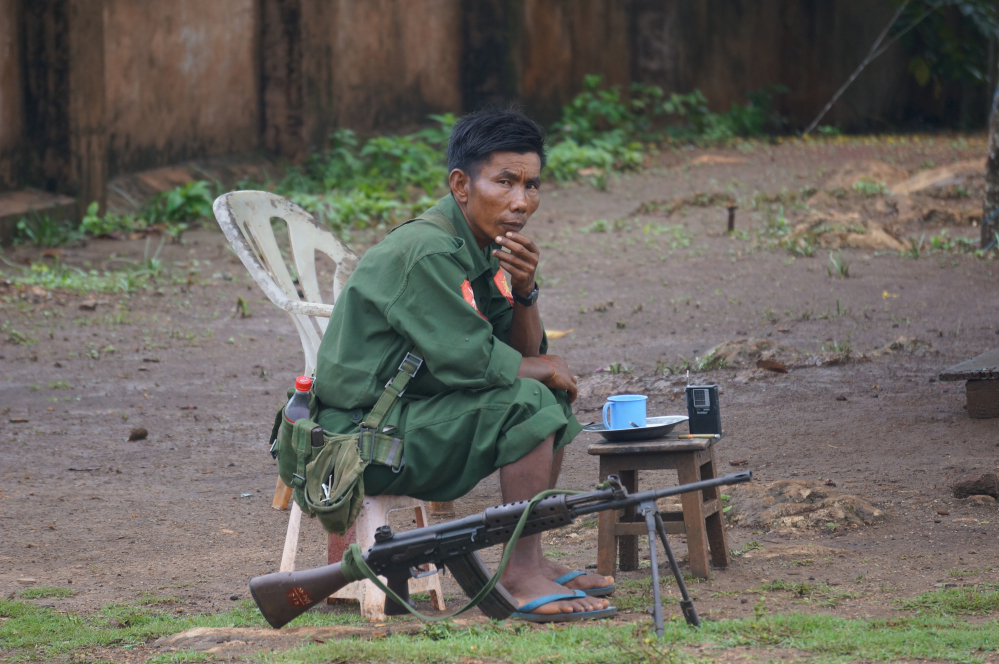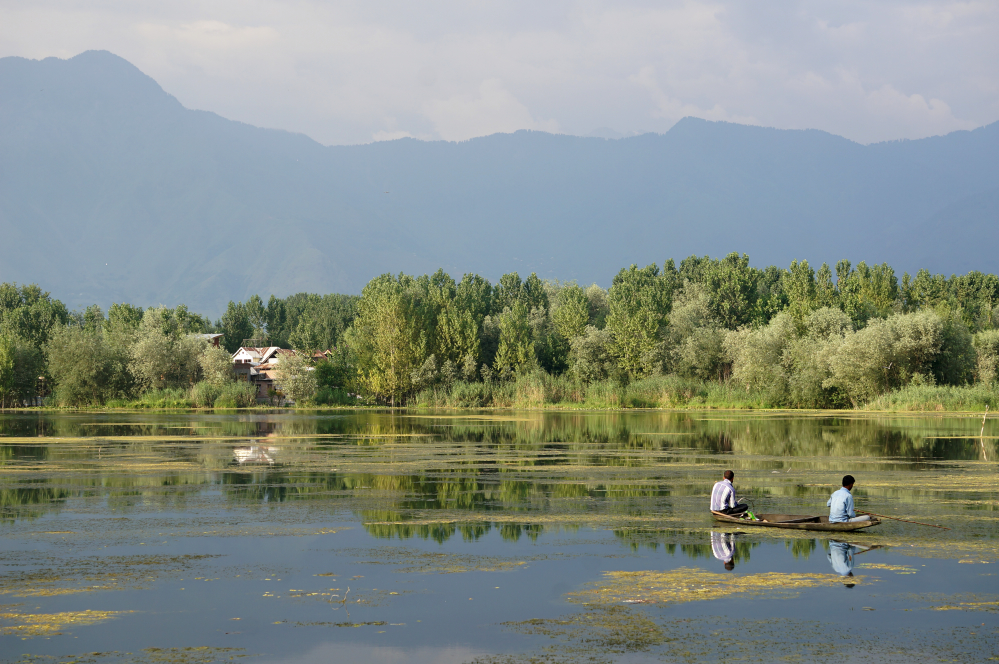During my 8 weeks in Northern Shan State the heavy military presence interrupts daily life. One of our football fields is taken over by soldiers who have decided they need the space. One evening on our way to karaoke we are stopped at a military checkpoint and questioned for ten minutes before being released. Every so often army helicopters fly over head.
“I was driving with a sticker commemorating the anniversary of the Ta’ang Army and I was pulled over by Burmese soldiers,” Yu Craw tells me. “They stuck a gun in my face and cocked the trigger and asked me if the Burmese soldiers had an anniversary would I have a sticker for them. In this area you are monitored by the government. As an associate of yours, I am too. But it is not safe to speak about such things in a public bar.”
When he finishes speaking he looks around suspiciously at the other patrons.
Around the corner from the office two soldiers with large rifles guard an army barracks. I pass them every day as I run up the hill to the pagoda. I am told by TSYU at the end of my stay in Lashio that the military were monitoring my movements in and out of TSYU, communicating with my colleagues about my whereabouts. I was told that the helicopters flying overhead were maintaining surveillance on the TSYU headquarters.
TSYU believes that one of the reasons the military have been deployed so heavily in the Shan state is to support and protect construction of controversial major infrastructure projects such as the Shwe Gas pipeline and the Upper Thanlwin hydropower project.
Pawing through the TSYU library I find Pipeline Nightmare (2012), a TSYU investigation and publication into the Shwe Gas pipeline. It states that in 2008-9 the Chinese National Petroleum Company signed a trade agreement with the Burmese government worth USD$29 billion for the Shwe Gas pipeline that stretches from the Bay of Bengal and the Rhakine state to Shan state and into China. Pipeline Nightmare says that in establishing this pipeline in 2011 the Burmese military evicted many ethnic communities from their homes and confiscated land. In best case scenarios the government compensated the people for their land although it is argued that the compensation was minimal.
“These people are usually farmers in rural areas. When the government take these people’s land they also take their livelihood,” my colleague, Mr Mai, says.
In worst case scenarios, fighting erupted between the Ta’ang National Liberation Army (TNLA) and the Burmese military.
Pipeline Nightmare claims that the government didn’t complete environmental impact reports and villagers have said the pipeline is causing flooding in areas. Burmese military have been employed as personal security for Chinese workers. They have imposed themselves upon the local people demanding food and assistance from the impoverished communities; forcing men into labour as navigators and as porters for their gear and committing acts of sexual violence against local women. Despite calls for peace in 2012, the Burmese army increased its presence along the pipeline. According to TSYU, as of 2012, 1,978 people were internally displaced because of the conflict. I assisted TSYU with writing reports from the conflict zone in Kookai Township where villagers are so afraid of soldiers they are fleeing in anticipation of trouble.
A former TSYU staff member, Amun, was invited to Beijing’s New-Century Academy on Transnational Corporations in May 2013 to talk about the impacts the project has had on the local people. Among the attendees were the Chinese National Petroleum Company, investors in the project, and the Chinese Chamber of Commerce.
“They were shocked by what I reported. They asked me how I knew what I knew and I told them: ‘Because we spoke to the local people at a grass roots level.’ They said they had paid compensation to the Burmese government and I told them if they wanted to pay compensation they should have paid it to the people. They said they would make changes but we haven’t seen any evidence of that.”
There are concerns that there will be similar results from the planned Upper Thanlwin (Mong Ton) Hydropower Project, a joint development by a consortium of China Three Gorges Corporation, Sinohydro and China Southern Grid, and a Thai corporation, EGATi. It is predicted that the project will take 14 years to complete and, if built, the Mong Ton dam will be the largest dam in Southeast Asia producing an estimated 7,000 megawatts, of which 90% will go to China and Thailand, with 10% reserved for domestic use. The project has been strongly protested against by the local people who are concerned by the negative social and environmental impacts, the militarisation of local communities, the safety of dam and mining sites, and the transparency of benefit sharing.
“In our experience the government and the corporations responsible for such projects take no responsibility for the negative impacts on the local communities. They do little to compensate the local people especially in regards to sharing the electricity the dam produces,” TSYU staffer, Thet Oo, tells me.
I was drawn to this particular story by chance while assisting Thet Oo write a letter demanding the consultancy firm completing the Environmental Impact Assessment (EIA) and Social Impact Assessment (SIA) cease action. That firm was the Snowy Mountains Engineering Corporation (SMEC), a name that should be recognisable to most Australians. SMEC has come under criticism from local people for their involvement in the project and have had to cancel meetings with local communities due to protests and opposition from villagers. As a result SMEC have publicly stated that interference with its data collection efforts could lead to ‘suboptimal outcomes for the affected communities.’
“Our role is as an independent consultant body,” Ben Robinson, the acting country manager for SMEC, tells me over the phone. “The continuation of the project is subject to approval of the Burmese government. We will try and gather as much data as we can and make it as comprehensible as possible.”
SMEC has been accused by Burma Rivers Network, a group of organisations representing various dam-affected communities in Burma, of attempted bribery and intimidation of local people to agree to terms. They have also been accused of breaching Burmese law which bans unlawful associations with ethnic armed groups; accusations which Ben Robinson states “have no basis in fact”.
Mark worked in an unpaid voluntary capacity teaching English to the Ta’ang Students and Youth Union in the Northern Shan State of Burma in May and June 2015.



